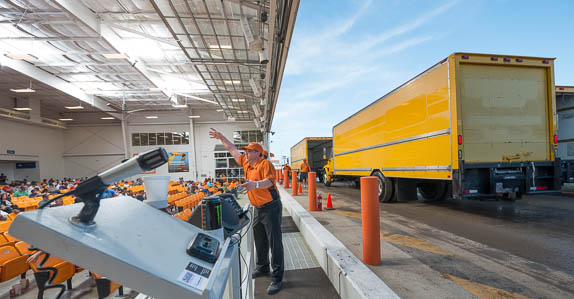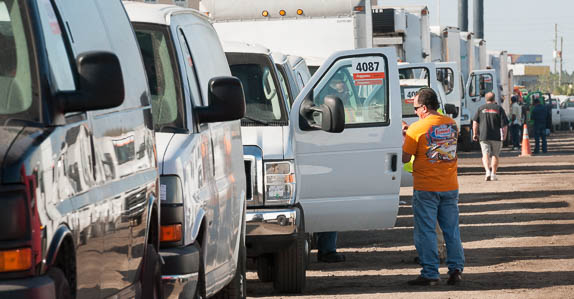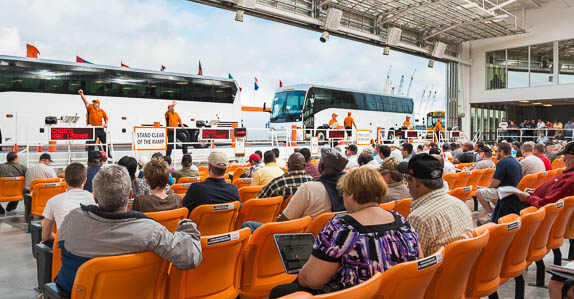
The number of mobile businesses are staggering, especially for food-based businesses such as food trucks, catering vans and bustaurants – buses transformed into restaurants. A study earlier this year by the University of Michigan and Northwestern concluded “there are over 4,000 food trucks operating in U.S. cities with more than 100,000 people.”1 From food trucks to vintage clothing boutiques, a new breed of business owners is saying goodbye to their landlord.
Tired of rising rental rates and unable to fight urban sprawl, shop owners, restaurateurs and budding entrepreneurs are opting out of the traditional brick-and-mortar business model and choosing to house their businesses in road-worthy van trucks, buses or recreational travel trailers.
Many types of businesses can be successfully transitioned from fixed address to mobile, including spas, pet grooming, tax preparation, art studios, specialty recyclers and photo studios.

Five things to consider before you buy
Depending on what kind of mobile business you are considering, a bus, van truck or even an RV could be the ideal vehicle. Here are five things to consider before you buy and convert a truck, travel trailer or bus into a mobile business:
1. GVWR (Gross Vehicle Weight Rating)
Will you be transporting staff, a stocked freezer, a commercial stove, tools, tool chests, parts or other types of assets and inventory? The total weight of people, equipment, materials and inventory you will be transporting add up to your maximum payload. Your maximum payload + GVW (Gross Vehicle Weight) should not exceed the vehicle’s GVWR. If you are purchasing a truck to tow a food cart or kiosk, you will need to add the gross weight of the cart or kiosk into the equation and not exceed the vehicle’s GCWR (Gross Combination Weight Rating).
2. Engine and transmission
Will you be doing a lot of highway driving or a lot of stop-and-go city driving? If you will be doing a lot of city driving, it would probably be wise to choose a vehicle with the most fuel efficient engine you can buy at the expense of some horse power. If you will be doing a lot of highway driving or a lot of driving in hilly terrain, you may want to select an engine with higher horse power at the expense of fuel efficiency. You will also need to decide between a diesel or gasoline engine. Trucks with gasoline engines usually cost less than trucks with diesel engines; however, diesel engines usually outlast gasoline engines.
Before you shop around for your truck, decide whether you need an automatic or standard transmission, a decision which may come down to your drivers’ preferences and experience.
3. Maintenance and operating costs
Review the maintenance log to see what type of services the vehicle’s owner has completed and how often. The frequency and type of service performed will give you an idea of the maintenance costs associated with keeping your vehicle road worthy. Also ask to see any work orders. For example, have the brakes been done recently or are brakes another expense you will need to work into your budget?
4. Size and features
If you are converting a van truck into a food truck, consider if there is enough space for all the necessary equipment, staff and inventory. If you are planning to start a mobile boutique, make sure you have enough room for a dressing room and for display. A small travel trailer can be an ideal set up for a mobile clothing business.
When considering a vehicle, you will also want to think about how you will load inventory. Is there side-door or rear-door access? Is there a ramp to accommodate a dolly or will you be hand balming items onto the truck? If you’re planning to operate your business in a hot climate, check if the truck has air conditioning for those long commutes to the location of the day. Of course, it always pays to do some research. Observe mobile businesses similar to yours and look for any pain points in their operations. Then plan how you can overcome or work around the problems you witnessed.
5. Cost
Refer to your business plan and determine how much you can reasonably afford to spend on a vehicle. Check recent selling prices for van trucks, buses or RVs and compare what you can afford to the selling prices. Is your number in the ballpark? (Tip: you can check two years of van truck prices on our website—just create a free account first.) If you want some financial breathing room, look into financing your vehicle purchase. Remember, you will also need to have money set aside for the conversion costs, plus a 10% contingency to take care of any surprise expenses or cost overruns.

Get your business started at Ritchie Bros.
The popularity of mobile businesses, particularly food trucks, seems to be on an upward trend in many urban areas across North America. If you are planning to take your business to the streets, consider buying a used truck at a Ritchie Bros. auction. We sell a huge selection of van trucks, buses and recreational travel trailers each year, and every item sells to the highest bidder on auction day – no minimum bids or reserve prices. With over 300+ equipment and truck auctions held each year, Ritchie Bros. auctions are your opportunity to find the truck you need for your mobile business.
Resources:
1. http://ns.umich.edu/new/releases/22337-study-identifies-factors-that-contribute-to-food-trucks-fast-spread




